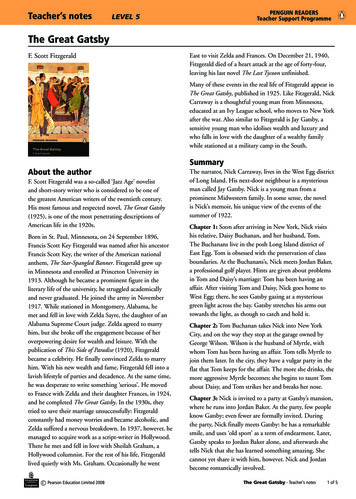
Transcription
HOWTO BE AGREATBOSS
Other Books by Gino WickmanTractionDecide!Get a Grip, with Mike PatonRocket Fuel, with Mark C. Winters
HOWTO BE AGREATBOSSGINO WICKMANAND RENÉ BOERBenBella Books, Inc.Dallas, TX
Copyright 2016 by Gino Wickman and René BoerAll rights reserved. No part of this book may be used or reproduced in anymanner whatsoever without written permission except in the caseof brief quotations embodied in critical articles or reviews.The 8 Questions , Core Focus , 3-Year Picture , The Five LeadershipPractices , The Five Management Practices , The Meeting Pulse , The“Level 10” Meeting , The Issues Solving Track , LMA , The PeopleAnalyzer , GWC , Delegate and Elevate , The EOS Process , TheQuarterly Conversation , Clarity Break , The 5-5-5 ,The 90-Day World are trademarks of Gino Wickman.EOS and The Entrepreneurial Operating System are registered trademarks of Gino Wickman.All rights reserved.BenBella Books, Inc.10440 N. Central Expy., Suite 800 Dallas, TX 75231www.benbellabooks.com Send feedback to feedback@benbellabooks.comPrinted in the United States of America10 9 8 7 6 5 4 3 2 1Library of Congress Cataloging-in-Publication Datais available upon request.ISBN-13: 978-1-942952-84-8 e-ISBN: 978-1-942952-85-5Editing by Glenn YeffethCopyediting by James FraleighProofreading by Brittney Martinez and Cape Cod Compositors, Inc.Text design and composition by Silver Feather DesignGraphic design by Drew Robinson Spork DesignFront cover design by Emily Weigel, Faceout StudioJacket design by Sarah DombrowskyPrinted by Lake Book ManufacturingDistributed by Perseus Distribution www.perseusdistribution.comTo place orders through Perseus Distribution:Tel: (800) 343-4499 Fax: (800) 351-5073E-mail: orderentry@perseusbooks.comSpecial discounts for bulk sales (minimum of 25 copies) are available.Please contact Aida Herrera at aida@benbellabooks.com.
To my 135 clients. The 1,700 full-day sessionswe have done together were the provingground for every word in this book.—Gino WickmanTo my supportive, resilient, andwonderful wife, Judy. Thank you for alwaysbeing there for me. I love you very much.—René Boer
CONTENTSWhy the Word “Boss”?ixChapter 1Being a Great Boss1Chapter 2Do You Have What It Takes?9Chapter 3Delegate and Elevate 21Chapter 4Surrounding Yourself with Great People35Chapter 5Leadership, Managementand Accountability (LMA)53Chapter 6The Five Leadership Practices 59Chapter 7The Five Management Practices 79Chapter 8The Quarterly Conversation111Chapter 9The Four People Issues131Chapter 10A Final Word on People147Tools Summary155Additional Resources157Acknowledgments159About the Authors163
WHY THE WORD “BOSS”?Consider this for a minute: no matter what title is on yourbusiness card, be it foreman, supervisor, manager, director,vice president, president, or chief executive officer, the people who report to you call you their boss.The word “boss” comes from the Dutch word “baas,”originally a term of respect used to address a person incharge. We use “boss” purposely because that is what youare—someone in charge, who leads and manages people. Ifyou are ever in doubt, please come back to this definition.We urge you to wear the title “boss” with pride. You’re incharge. Be in charge. Don’t be apologetic or tiptoe around it.Don’t give in to all the politically correct and watered-downtitles such as “team leader,” “coach,” or “people champion.”These terms certainly describe what a great boss is and does;they’re just not all-encompassing titles. Take pride in theresponsibility, but don’t become arrogant or take the title“boss” for granted.Never use the phrase “I’m the boss” in an overbearing orentitled manner. No one respects people like that. Instead,they whisper behind the backs of bosses who are so stuck onthemselves that they take their authority and responsibilitylightly.ix
xH OW TO B E A GR E AT B OSSWalk through the offices or visit the production floors ofgreat companies and you’re likely to find engaged employees who are well led by great bosses. Those bosses create anenvironment where people show up every day because theywant to be there, not because they have to.So, if you’re a leader or manager of people and you aspireto be a great boss, this book is written for you. You need onlykeep an open mind and commit to becoming great. We’llprovide you with the tools to help you get there.
CHAPTER 1“If we treat people as they ought to be, we help thembecome what they are capable of becoming.”—GoetheWHAT IF EVERY DAY YOUR PEOPLE brought their“A game” to work? Do you believe that is even possible?In the next 154 pages we intend to show that it is possible, and we will teach you the tools that will transform howwell your people perform for you. You will discover how to: effectively delegate work and free yourself up totruly lead and manage,assess your team and surround yourself withGreat People,1
2H OW TO B E A GR E AT B OSS apply five leadership practices and fivemanagement practices of all great bosses,communicate powerfully with each of youremployees, anddeal with employees that don’t meet yourexpectations.This book is different from any other leadership or management book you’ve ever read—and literally tens of thousands of them have been written. What makes it different isits practical application and immediate impact. It offers notheory. Instead, it offers a straightforward game plan to helpyou become a great leader and manager. We can say thatbecause every word and tool in this book have been testedand proven by thousands of leaders and managers whoseinfluence and results are undeniable.In the last twenty years we have personally worked withthe leadership teams of more than 180 companies and morethan 2,000 leaders and managers. In addition, our organization, EOS Worldwide, has 150 EOS Implementers aroundthe world who have taught these tools to another 2,500companies and more than 25,000 leaders and managers.Because we have tackled day-in, day-out problems with somany bosses, we know what works and what does not.Gino’s first book, Traction, which has sold hundreds ofthousands of copies, uncovered a vital need in the smallbusiness world: a need for a simple, real-world guide tohelp the leaders and managers of entrepreneurial companies become great bosses. That compelled us to write this
Being a Great Boss3book and provide that simple formula. Anyone with directreports who is seeking a practical, proven way to excel atwhat they do can follow these steps to bring out the best intheir people.This book is for you if: you are a leader, manager, or supervisor ofpeople in a privately held, 10- to 250-personentrepreneurial company; or you want to get the most out of your peopleand seek a simple, effective, and impactful wayto become a great boss.This book is also written to help the “not-so-goodbosses” get out of the way—to help them acknowledge thatthey lack the basic understanding, desire, and capacity todevelop the skills that will make them great.We have learned that to get the most from your people—to have a highly motivated workforce—you, in your role asboss, must create an environment where your people willthrive. Matthew Kelly, in his book Off Balance: GettingBeyond the Work-Life Balance Myth to Personal and Professional Satisfaction, points out that highly motivated employees enjoy both personal and professional satisfaction fromwhat they do. “They work hard . . . they enjoy the people theywork with; they feel respected by their boss; they feel theirwork is making a contribution to customers’ lives; they findthe challenge of their work matches their abilities; and theyknow why they go to work each day.”
4H OW TO B E A GR E AT B OSSThis may be apparent to you already, but what is surprising is this: Kelly, in his efforts to find a link between“work-life balance” and a highly engaged workforce, interviewed well-respected people at dozens of the world’s bestcompanies. He asked these companies if he could interview people who they thought best exemplified work-lifebalance. What he discovered after interviewing these people was that they actually worked an average of nine hoursmore per week than their counterparts did. They valuedjob satisfaction over work-life balance. So, when you focusyour efforts to improve your people’s satisfaction level withtheir jobs, versus the number of hours they work, think ofthe upside.Here’s something else we’ve learned after we surveyedour clients at EOS Worldwide. When asked why theyengaged us, 82.4 percent reported they were not gettingenough out of their people; they weren’t on the same page,working together to win. In fact, “people issues” are oneof the most common frustrations shared by bosses—notsales, not profit . . . people! However, keep this in mind: asfrustrated as you might be with your people, the fact is, they areyour number one competitive advantage.Think about that for a minute. You may hold patents,own proprietary technology, and have tremendous brandawareness, but in the end, it all boils down to people. So,for better or worse, the people you employ or who reportdirectly to you are your only real differentiator.Competitors can steal your ideas and copy your products. After all, they essentially do what you do. They can
Being a Great Boss5even steal your playbook—how you do what you do. But itdoesn’t matter because in the end, being a great boss comesdown to execution—doing what you do better than thecompetition. Here is a great example. During the 1960s,opponents of the Green Bay Packers, who won two SuperBowls and five NFL Championships during that decade,had seen Vince Lombardi’s famous “Power Sweep” so manytimes that they not only knew the play inside and out, theyalso knew when it was coming. But they still couldn’t stopit. Lombardi was that good at leading his players to becomethat good at running that play.The advantage of being a boss like Lombardi is that youhave the opportunity to surround yourself with people whoyou want to work with and who want to succeed. You havethe responsibility to hire them and fire them. If you’re notsatisfied with the performance of the people reporting toyou, you have to accept the responsibility of doing something about it. However, before you fire anyone, you mustask yourself, “Have I done everything possible to makethem successful? Have I failed them in any way?” Make sureyou’ve done your part.As we’ve mentioned, the tools we teach in this book aresimple; they have to be, because the journey to become a greatboss is not easy. People often confuse “simple” and “easy.” Thedefinition of “simple” is not elaborate, not complicated, easy tounderstand. The definition of “easy” is not hard or difficult;requiring no great effort; free from pain, discomfort or care.The tools and exercises that comprise this “how to” guidehave been honed while working hands-on with thousands
6H OW TO B E A GR E AT B OSSof bosses. In each chapter we share stories from every typeof boss—owners, leadership team members, managers, andsupervisors—to show you that these tools truly work forbosses at any level. They will help you lead, manage, andretain the sort of employees we call Great People. And themore Great People you surround yourself with, the moreGreat People you will attract to your organization. TheseGreat People will free you from the day-to-day grind thathas kept you from getting the most from your business andliving a more fulfilling life. If we’ve piqued your interest,read on.STATE OF THE AMERICAN WORKFORCESince 2000, the Gallup Organization has been conductingan annual survey of American workers. The results haven’tchanged much year to year and reveal that only 31.5 percentof full-time American workers are “engaged” at their jobs.These employees show up early, leave late, come up withcreative solutions, attract and retain customers, and bringenergy to the workplace. Jim Clifton, Gallup’s CEO, assertsthat this group more than likely works for a great boss.However, Gallup reports that 17.5 percent of Americanworkers are “actively disengaged” at work. This group likelyworks for a boss that makes them miserable, and as a result,they spread their discontent throughout the organization.These employees are more likely to steal from their employer,miss days at work, and drive customers away.
Being a Great Boss7Sadly, the survey shows that the remaining 51 percent ofAmerican workers are “not engaged” at work! These employees meet the minimum requirements, but they don’t viewtheir jobs as a major component of their daily lives. They’reflying just under the radar while collecting their paycheck.It’s been estimated that their lost productivity costs Americanbusinesses a staggering 500 billion annually.Clifton goes on to state that the single most importantdecision that business owners make is deciding whom tohire or promote to management positions. Choosing theright people propels their companies forward, while thewrong people hold them back. Additionally, a 2015 HarrisPoll revealed that 39 percent of employees have no idea oftheir company’s goals and objectives, 47 percent are unfamiliar with the state of their company’s performance, and44 percent don’t understand how the role they play helps theorganization meet its goals.Think about the implications for your organization.Gallup suggests that only a third of your employees areactually driving your results. If everyone were activelyengaged at work, what results could you achieve?Whether your results are better or worse than thoserevealed by these polls, you can see that significant opportunity may well exist in your organization. Are you willing to take responsibility for all the issues that have causedemployees to disengage? For example, if you are constantlyfrustrated with people who don’t meet your expectations, butyou don’t explain your expectations, you may be part of theproblem. Acknowledging and taking responsibility for poor
8H OW TO B E A GR E AT B OSSemployee performance and engagement is the first step. Poorbosses don’t grasp this and will blame factors “beyond theircontrol.” Great bosses will rise to the challenge. Which bossare you?We’re facing a crisis that is not just measured by a lackof opportunity for the workforce, but also by the lack ofenthusiasm that the workforce has for their jobs. We’re losing our competitive advantage. You cannot expect to meetyour goals with half your team sitting on the bench—and17.5 percent actually heckling you. You need an engaged,raring-to-go workforce. Your choices are to lead, follow, orget out of the way. You must decide. And remember, choosing not to be a great boss is okay. Just get out of the way andbe willing to follow.So, do your people truly matter to you? Do you viewthem as your number one competitive advantage? Are youexcited about building a team of highly motivated employees and getting the most from them? If so, then get ready toanswer the question that starts the next chapter.
CHAPTER 2“Most people work just hard enough not to get firedand get paid just enough money not to quit.”—George CarlinYOU CAN REACT in one of two ways to comedianGeorge Carlin’s joke. The not-so-great bosses laugh and nodtheir heads, accepting his words as the status quo. They’reoften heard saying, “Good people are so hard to find.” Or, “Idon’t pass out many compliments because when I do, theyexpect a raise.” Or, “Why invest in training when they’llleave us in a heartbeat for more money?”By contrast, great bosses see beyond the intended humorand realize that the problem isn’t with the people, it’s withthe not-so-good bosses who lead those people. They don’t9
10H OW TO B E A GR E AT B OSSaccept this sad state of affairs. They’re willing to challengethe status quo. They’re often heard saying, “I’ve got a greatteam of people and I feel privileged to lead them” and “Mypeople keep me on my toes and make me better.”A boss that exemplifies this is Trevor Moses of imageOne,a managed print provider. He believes that, as a boss, one ofhis responsibilities is to develop his people and improve theirskills. This makes them more upwardly mobile within hisorganization, and in the highly unlikely event that his company should close its doors, more marketable when they lookfor a job immediately afterward.So, whether you find Carlin’s humor funny or not, youmust take responsibility for your people as Moses does andbe willing to do something about it.Great bosses earn the respect of those they lead; theydon’t take it for granted. Sadly, too many bosses don’t getit. They think their title empowers them with unquestionedauthority to act in whatever manner they deem necessary. These bosses view themselves as kings and queens oftheir realm. In their minds they rule supreme. This line ofdestructive thinking didn’t play out well for France’s KingLouis XVI. In 1793, after his subjects rose up in revolt, theyshortened his inflated ego by about a foot—a head, actually.In this chapter, we ask you to evaluate whether you’retruly up for the challenge of being a great boss. We willexplain that to fill that role, you must:1. Get it—have the aptitude, natural ability, andthorough understanding of the ins and outs ofthe job;
Do You Have What It Takes?112. Want it—sincerely desire the role;3. Have the Capacity to do it—possess theemotional, intellectual, physical, and timecapacity to do the job.The first two assets—“get it” and “want it” are essentialfor becoming a great boss. No one can help you “get it” or“want it.” Either you have these two things or you do not.The third asset—“capacity to do it”—can be acquired if youare willing to invest the time and effort to excel in the role.UNDERSTANDING “GET IT”You’ve probably worked with people who, despite extensive training, coaching, and time in the position, didn’t havea thorough grasp of their role, the organization’s systems,pace, or culture, or the ins and outs of the job—they simplydidn’t get it.To be a great boss, you must honestly ask yourself if youtruly get it—that you thoroughly grasp the job. You mustcomprehend it so well that there is no question in your ownmind or those of your peers and direct reports.Ken Robinson, in his book, The Element: How FindingYour Passion Changes Everything, defines “get it” as follows:“Get it is aptitude; or the natural ability for something. Anintuitive feel or grasp of what the job is, how it works andhow to do it. Natural feel: biochemistry.”One great boss demonstrated that he had the intuitive feelfor the job when, as general manager, he was deployed by a
12H OW TO B E A GR E AT B OSSnational retailer to turn around one of its worst-performingstores. After careful analysis, the company had decided to closethe worst of their outlets. On that list was a store that hadthem baffled. Although it was located in an area with plentyof traffic and great visibility, it continually lagged behindother stores in the system.In a last-ditch effort to turn things around, the companyplaced this great boss, a manager who “gets it,” in charge ofthe store. Several weeks later, the store’s sales were makingsteady upward progress, which delayed the decision to closeit. Within a few months, the store was one of the top performers in the system—amazingly, with very little turnoverand no additional cost.When asked how he had accomplished the feat, themanager replied that he simply asked each employeewhether he or she was a “box person” or a “people person.”He explained that a box person is well organized and greatat keeping things in their place, whereas a people personenjoys engaging customers and meeting their needs. Hethen assigned people in each group appropriately, allowingthem to leverage their individual strengths.This is a good example of a boss who truly “gets it.”That natural aptitude and ability is fundamental to being aboss. No public relations or marketing efforts in the worldwould have made a difference in keeping that store open. Itrequired someone who “got” how to lead and manage peoplein a big box retail store.Now, with this story in mind, are your actions as a bossshowing others that you truly get it? For instance, do you
Do You Have What It Takes?13use the same approach to motivate every employee, or doyou have a deeper understanding and appreciation of themas individuals? Do you have that instinctive feel for rallyingeveryone according to the way they work best? Imagine howyour employees would describe you to their friends or fellowworkers. What would they say?UNDERSTANDING “WANT IT”Next, you must ask yourself if you truly want it—that yougenuinely desire the job of being a great boss. No one talkedyou into it or begged you to take it. No one promised youa raise, a bonus, or a company car to entice you. You mighthave a bad day or two—that’s normal—but the challengesand obstacles energize you. You enjoy overcoming thoseobstacles. They don’t wear you down.One of our clients described a former boss who wouldoccasionally ask midlevel managers who he suspecteddidn’t want it, “Do you have the fire in your belly to lead?”In almost every case that person would answer yes. Hefollowed that question with this statement: “You are telling me you want to lead, but you’re not showing me.” Thisserved as a wake-up call for those managers, a friendly tapon the shoulder to remind them that actions needed tofollow words.John Eadie, founding partner of Covenant Multifamily Offices in San Antonio, Texas, says this about wantingit: “I have had the benefit of great teaching and training
14H OW TO B E A GR E AT B OSSthroughout my career, but I’ve come to realize that evenwhen people receive great training and have great mentors,unless they really ‘want it,’ those things likely will not stick.It’s gratifying to work with people who truly want it and arewilling to put in the effort necessary to achieve it.”So, do you have the “fire in your belly” for the trials andtribulations of being a great boss? Do your actions showothers that you truly want it? As an example, are you willingto go the extra mile to get a project completed on time, or doyou leave work early regardless of how it affects your teamor customers? Again, imagine how your employees woulddescribe you to their friends or fellow workers. What wouldthey say?The fact is that many bosses really don’t get it or wantit—yet both are crucial. Think about it: you could absolutely“get” the role of being a boss but just not “want it.” Or, youcould “want it” with all your heart and soul but not “get it.”In either scenario you’ll never be a great boss. You must “getit” and “want it.”Assuming that you get it and you want it, the next question is, “Do you have the capacity to do it?”UNDERSTANDING“CAPACITY TO DO IT”While not getting it or wanting it are deal killers, someproblems of capacity can be solved. If you lack any of theaspects of capacity described next but are willing to invest
Do You Have What It Takes?15the time, resources, and energy to gain them, you canbecome a great boss.THE FOURTYPES OF CAPACITYIf you’re fortunate, you’ve worked for a great boss in the pastor you’re working for one now, one who probably possessesthe four types of capacity to do a great job. You thereforehave a role model you can emulate. Now, here’s the questionto ask yourself: “Do I have the emotional, intellectual, physical, and time capacity to be a great boss?” Let’s take themone at a time:1. Emotional CapacityThe heart to feel what others are feeling, the ability to walk amile in their shoes, to be open and honest with yourself andothers, a willingness to be real and connect with others, tobe humbly confident, and to be self-aware enough to knowhow you are influencing people.2. Intellectual CapacityThe brains to do critical thinking, solve complex problems,predict, prioritize, and plan, along with the ability to conceptualize, strategize, and systematize how best to do thingswhile orchestrating human resources. F. Scott Fitzgerald
16H OW TO B E A GR E AT B OSSdescribed intelligence as “the ability to hold two opposedideas in the mind at the same time, and still retain the abilityto function.”3. Physical CapacityThe stamina, energy, and tenacity to do what it takes to finish what you start, to “pour it on” when necessary, to devotethe time and effort to master your craft, to do the work, andto get your hands dirty when necessary.4. Time CapacityThe self-discipline to use your time effectively, to avoid thetyranny of urgency, to structure, prioritize, organize, anddelegate in a way that frees up and optimizes the most precious resource of all—your time.If you’ve been in the workforce for any length of time, you’veprobably worked for a not-so-good boss. You’ve witnessedfirsthand how a boss who lacks any of the four types of capacity can harm a department or an entire organization.Here are some examples:Low Emotional CapacityThese bosses are usually oblivious to the signals their subordinates are sending them about how their behavior affectsothers. At best, they make a superficial connection with
Do You Have What It Takes?17their people. They’re not honest with themselves and lackthe self-confidence to be open and honest enough to say, “Idon’t know, I need your help, I made a mistake.” They’ll takecredit for success but avoid accepting responsibility whenthings go wrong.Low Intellectual CapacityThese bosses usually lack the ability to visualize an outcomebefore taking a course of action. They tend to set objectiveswithout anticipating the resources needed to meet thosegoals. They lack mental agility, overanalyzing some thingsand oversimplifying others.Low Physical CapacityThese bosses lack the stamina and energy necessary to seetasks to completion. They rarely leave the office to inspectwhat they expect. They’re unable or unwilling to do thehard work, to get their hands dirty, or to pitch in whenneeded.Low Time CapacityThese bosses are usually a whirling dervish of activity, robbing time from others while using theirs to pursue thingsthat are “in the moment.” They expect others to drop whatthey’re doing to help them get caught up. They’re usuallylate for meetings, behind schedule, overwhelmed, and afraidor incapable of letting go.
18H OW TO B E A GR E AT B OSSAlthough these criticisms sound a bit harsh, they probably fit bosses you know. To excel as a great boss, you mustpossess all four types of capacity. If you don’t, you must firsttake stock of yourself to acknowledge anything you need towork on. More than that, you must commit to exerting theconsiderable effort necessary to develop a capacity that youdon’t already possess.The bosses that don’t get it, want it, or have the capacity to do it are often the root cause of organizational dysfunction and their company’s poor performance. They think,“If those knuckleheads didn’t bang on my door all the time,I’d love being a boss!” Don’t blame the guys on the loading dock, or the salespeople, or the technicians. Bad bossesdrive their best employees and eventually their best customers away. They feel threatened by people smarter, morecapable, or more motivated than them. They run from conflict, unwilling to confront real issues or make unpopulardecisions. They’re quick to point out flaws in others whileignoring their own.If, after reading this chapter, you realize that you don’tget it, want it, or have the capacity to fill the role of boss,do yourself a favor and step down. Do something that trulyinspires you. Life is too short to spend it doing somethingthat makes you miserable and leaves you feeling unfulfilledand continually frustrated. Being a bad boss does not makeyou a bad person, just a bad boss. To paraphrase the Wizardof Oz when Dorothy called him a bad man: “Oh, no, mydear; I’m really a very good man, I’m just a very bad Wizard.”
Do You Have What It Takes?19If this describes you, don’t despair. The fact is you do havea God-given skill set. It’s just not as a boss. You owe it toyourself to discover your unique skill set and then pursue itwith all your heart.On the other hand, if you realize that you haven’t beena great boss, but you are ready, willing, and able to becomeone, there’s still hope. Paraphrasing Pogo: “You have met theenemy and he is you.” It’s time to learn about a powerful toolthat will help you get there.
CHAPTER 3“The average person puts only 25% of his energy andability into his work. The world takes off its hat tothose who put in more than 50% of their capacity, andstands on its head for those few and far between soulswho devote 100%.”—Andrew CarnegieIF YOU’RE LIKE MANY BOSSES that we’ve workedwith, you are frustrated by a lack of time to do your job well.In this chapter we will teach you the ultimate time management tool, Delegate and Elevate , to help you clarify andidentify the activities that you must delegate to others inorder to free up your time capacity to be a great boss.21
22H OW TO B E A GR E AT B OSSCompleting the Delegate and Elevate exercise helps youdiscover whether you truly want to do boss-related activitiesfocused on leading and managing people. It also shows youhow to look at the activities you find yourself doing over thecourse of a week or month. Further, it explores how muchyou enjoy them and your competence in doing them. Thiswill help you “discover” those activities that energize you andthose you should delegate to others. Remember, to becomea great boss, you need enough time. This tool will put yourtrue gifts in perspective so you can focus your energy andtime on your strengths. After all, no one has the ability ortime to do everything, and the sooner you delegate, the better your department will run.The Delegate and Elevate exercise is a five-step processthat should not be hurried. We ask you to be thorough witheach step. They are as follows:Step 1List all of the business-related activities that you do duringthe course of a day, week, and month. Write them down ina journal or a notebook. This l
—Gino Wickman To my supportive, resilient, and wonderful wife, Judy. Thank you for always being there for me. I love you very much. . Gino’s first book, Traction, which has sold hundreds of thousands of copies, uncovered a vital need in the small bus











